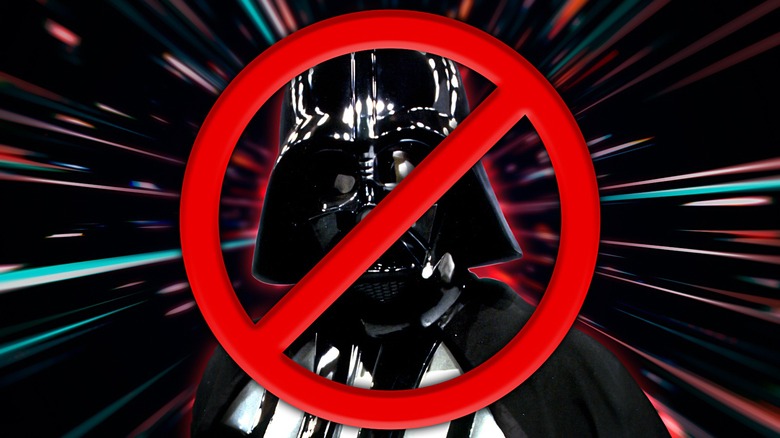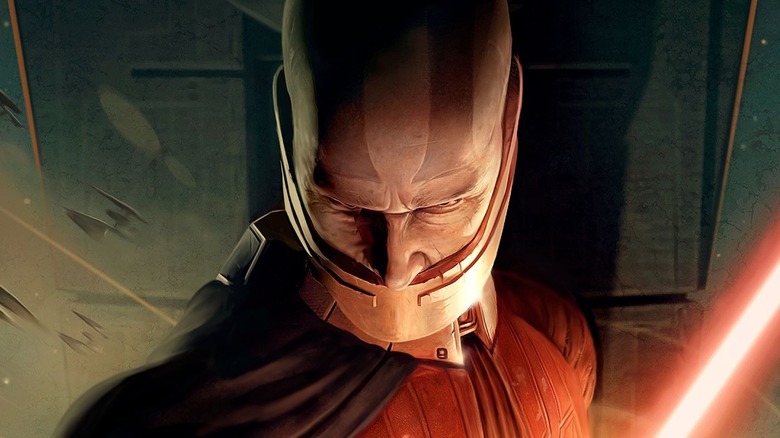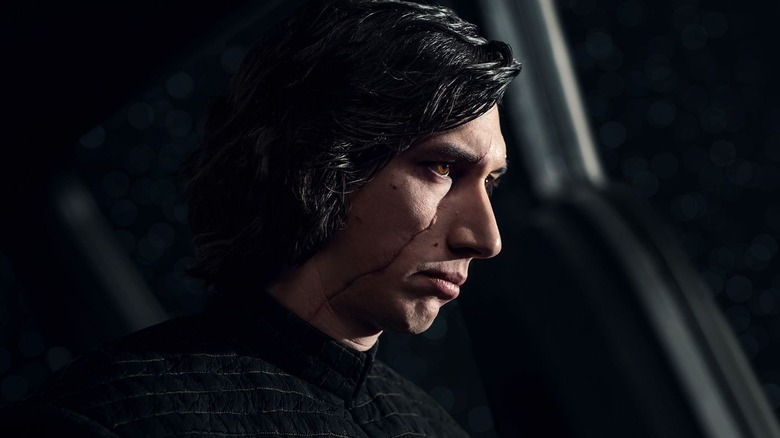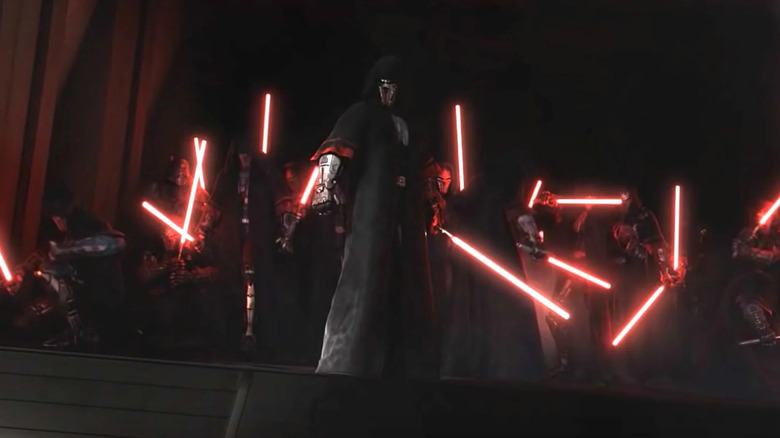Being A Sith Was Illegal In Star Wars - But That Changed For A Good Reason
Everyone knows that the Sith are the longstanding villains of "Star Wars" — the shadowy foils of the Jedi, twisted by the dark side, hiding in the deep corners of the galaxy, always waiting to strike. Or at least, that's how they're typically portrayed. Like the Jedi, the Sith change a lot across different parts of the franchise, varying in form and function depending on where you are on the "Star Wars" timeline and whether you're in the current canon or the old Expanded Universe, aka "Star Wars" Legends.
In both versions, the origins of the Sith are much the same as those of the Jedi. They began as a religious order interested in studying, communing with, and channeling the Force. Both the canon and Legends timelines include actual species that bore the Sith name first. And, in both versions, the Sith ultimately rose as a galactic power due to the defection of powerful Jedi to the dark side.
What you might not know is that in the Legends timeline, the Sith religion was actually banned by the Republic for thousands of years. The so-called "Anti-Sith Bill" was passed after a period of immense galactic turmoil and a series of wars fought between the Sith and the Jedi. The Jedi Civil War, depicted in "Star Wars: Knights of the Old Republic," was the last straw. Afterward, the Senate passed a resolution prohibiting all study of Sith philosophy, even if it wasn't part of any criminal or military action. And yet, by the start of the prequel trilogy, this ban was repealed.
The Republic took drastic measures to stop the Sith
Banning an entire religion galaxy-wide might seem like an extreme move — because it is — but it's not hard to see how the Old Republic got to that point. Warring with the Sith devastated the galaxy for many years in the Legends timeline, with some worlds, like the planet Taris, being bombarded to near-destruction. The threat of invasion was immense, and Sith rule is generally portrayed in the Expanded Universe as oppressive and cruel. When the Republic finally emerged from the Old Sith Wars, galactic leaders clearly wanted to prevent anything similar from happening again. Spoiler alert: It all happened again. Many times, in fact.
The chain of events is less clear in the current canon, however. The Anti-Sith Bill is only referred to in the "Darth Bane" books and some other Legends novels. As of now, there is no canonical example of the Republic legally banning Sith religious practice or philosophical study in canon. Of course, there's certainly room for the Anti-Sith Bill to be reinstated.
As the story goes in Legends, the ban became less and less relevant after the Sith disappeared from galactic affairs. For a thousand years leading up to "The Phantom Menace," the Jedi even believed the Sith to be extinct. As such, the law eventually fell to the wayside, and later Republic laws were put in place to protect religious freedom and prevent faith-based persecution. That included Sith doctrine and beliefs, effectively unbanning the religion.
Not all Sith are bad
The fact that the Anti-Sith Bill existed at all in "Star Wars" Legends presents an interesting question: Was it right? Was it just? At the point in time when it was instituted, the Sith had recently caused untold suffering across the galaxy. Even still, is that enough to warrant outright religious prohibition?
While the most famous Sith throughout history have used the dark side to accumulate power and cause harm, not all have been villains. The faith itself is, in a vacuum, simply philosophical. The Sith Code declares that passion is the most important driving force in life. It encourages those who follow it to pursue power so that they might "break their chains" and achieve true freedom. It's a doctrine easy to take to extremes, but it's possible to hold true to it and not cause harm to the world around you. In other words, not every Sith is evil.
Darth Vectivus was a Legends Sith Lord who achieved great power during the Rule of Two era but used it generally in pragmatic and fair ways. While he still sought strength and wealth, he did so without causing any widespread harm, working as a businessman and taking care of his own people. He wasn't the only one, either. Go further back in the timeline to when the Sith were legion, and you'll find all kinds of dark-side practitioners in the Old Republic just trying to make their way in the galaxy apart from Jedi dogma and Republic rule.
Should the Sith religion be outlawed in Star Wars?
The question of Sith ethics changes depending on which version of "Star Wars" we're discussing. Many of the Old Republic games, books, and comics from the Expanded Universe portray the Sith as a flawed group, but one that isn't inherently evil. It's individuals who become corrupted by the dark side.
The Jedi have proven time and time again that their own doctrine is full of holes. They're so afraid of emotional connections in the prequels that they prohibit all forms of attachment, and they frequently allow themselves to become pawns of the state to promote peace and order. In "Star Wars: The Clone Wars," we see how many planets and star systems suffer under Republic neglect. That's why several joined the Separatists under Count Dooku. And just as there were well-meaning Separatists, so too could there be good Sith.
The current canon has erased a lot of that nuance, unfortunately. These days, the dark side is more often portrayed as a universally corrupting power, though there are still a handful of exceptions. Despite that, it's clear that Sith ideas aren't really the root of the problem. Ultimately, the Sith doctrine of embracing passion, like most Jedi dogma, is just a tool, made good or bad by whoever wields it. Though the dark side will always be dangerous, the Republic was right to lift its ban on all practice of the Sith religion.



